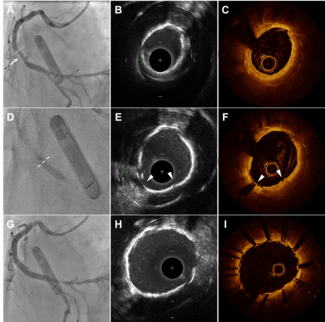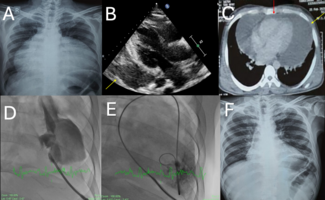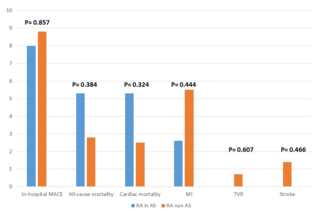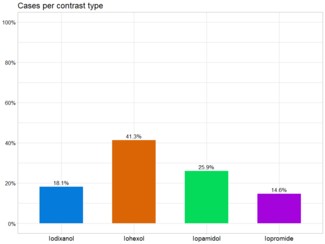Chordal Rupture Following MitraClip Implantation Resulting in Massive Mitral Regurgitation
Abstract: MitraClip (Abbott Vascular) therapy has been reported to be a safe and effective treatment for mitral regurgitation, even when the commissures are targeted. However, complications during the procedure may occur. We present a 44-year-old patient who underwent MitraClip implantation complicated by chordal rupture, resulting in emergent mitral valve replacement.
J INVASIVE CARDIOL 2015;27(10):E224-E225
Key words: MitraClip, complications, valve disease
_________________________________________
Case Report
 A 44-year-old male was diagnosed with non-ischemic dilated cardiomyopathy (left ventricular ejection fraction, 50%) and severe functional mitral regurgitation (MR). Mitral surgery was rejected due to high perioperative risk (morbid obesity, with body mass index of 55 kg/m2, and severe restrictive pulmonary disease) and the patient was selected for MitraClip (Abbott Vascular) implantation.
A 44-year-old male was diagnosed with non-ischemic dilated cardiomyopathy (left ventricular ejection fraction, 50%) and severe functional mitral regurgitation (MR). Mitral surgery was rejected due to high perioperative risk (morbid obesity, with body mass index of 55 kg/m2, and severe restrictive pulmonary disease) and the patient was selected for MitraClip (Abbott Vascular) implantation.
Transesophageal echocardiography showed a large coaptation defect with severe holosystolic mitral insufficiency (Figure 1A). A MitraClip device was successfully implanted at the A2-P2 interface, with a significant reduction of mitral insufficiency, but moderate (2+/4+) residual MR persisted due to a lateral jet (Figure 1B). A second MitraClip was grasped beside the first device, with a significant reduction of residual MR to mild degree; however, after deployment, a severe mitral insufficiency reappeared with two jets – one intraclip and a larger one laterally (Figure 1C). We attempted to implant a third device at the anterolateral commissure, but grasping was suboptimal and the MitraClip was entrapped in the subvalvular apparatus. After complex maneuvers, it could be released, but a chordal rupture occurred, leading to severe MR due to P1 segment flail (Figure 2 and Videos 1 and 2). After deployment attempts were unsuccessful, the patient underwent emergent mitral valve replacement, which was carried out without further complications.
 MitraClip therapy has been reported to be a safe and effective treatment for MR, even when the commissures are targeted.1 However, complications during the procedure may occur, such as clip entanglement in the chordae. Once the clip is trapped, maneuvers to release it must be soft and gentle; otherwise, the subvalvular apparatus may be damaged and this may prompt the development of significant mitral insufficiency.
MitraClip therapy has been reported to be a safe and effective treatment for MR, even when the commissures are targeted.1 However, complications during the procedure may occur, such as clip entanglement in the chordae. Once the clip is trapped, maneuvers to release it must be soft and gentle; otherwise, the subvalvular apparatus may be damaged and this may prompt the development of significant mitral insufficiency.
References
- Estevez-Loureiro R, Franzen O, Winter R, et al. Echocardiographic and clinical outcomes of central versus non-central percutaneous edge-to-edge repair of degenerative mitral regurgitation. J Am Coll Cardiol. 2013;62:2370-2377.
_______________________________________
From the 1Interventional Cardiology Unit, Division of Cardiology, and 2Department of Cardiovascular Surgery, Complejo Asistencial Universitario de Leon (CAULE), Leon, Spain.
Disclosure: The authors have completed and returned the ICMJE Form for Disclosure of Potential Conflicts of Interest. Dr Estevez-Loureiro reports personal fees from Abbott Vascular. The remaining authors report no conflicts of interest regarding the content herein.
Manuscript submitted March 30, 2015, provisional acceptance given April 6, 2015, final version accepted April 13, 2015.
Address for correspondence: Rodrigo Estévez-Loureiro, MD, PhD, FESC, Interventional Cardiology, Complejo, Asistencial Universitario de León, Altos de Nava SN, 24008 León, Spain. Email: roiestevez@hotmail.com


















